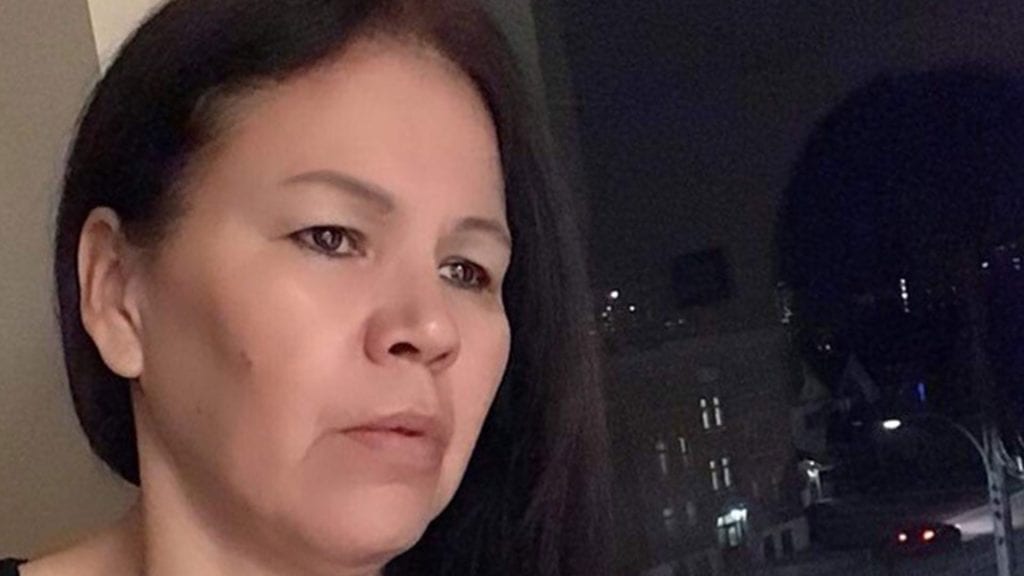
Odelia Quewezance was 21 when she was convicted of second-degree murder and sentenced to life in prison. Photo: APTN file
The Congress of Aboriginal Peoples (CAP) is appealing to Prime Minister Justin Trudeau and Justice Minister David Lametti to help in the release of two Saskatchewan sisters who have served more than 25 years each in prison for a murder they say they didn’t commit.
Odelia and Nerissa Quewezance’s stories were profiled in a two-part episode of APTN Investigates called A Life Sentence.
CAP National Vice-Chief Kim Beaudin called for their release at a press conference Tuesday.
“I fully believe that our people are political prisoners,” Beaudin said, “The system is stacked against our people and we believe there was a miscarriage of justice.”
Beaudin called on the prime minister and justice minister to review the case.
APTN News requested a comment but nothing has been received as of this posting.
“Odelia and Nerissa have suffered enough at the hands of the Canadian justice system, and they must be cleared of all wrongdoing in this case,” he said in a news release, “We’re not going to let the Canadian Government off the hook with a declaration of time-served, there must be a formal apology, and they must have their records expunged.”
Odelia Quewezance attended the conference by video from a Western Canadian healing lodge and her sister Nerissa joined by phone from an undisclosed location.
She is currently wanted on a Canada-wide warrant for parole violations.
“Today I come to you to ask in a good way for it has been 28 years that I have been in prison,” Odelia said, holding an eagle feather “I always believed in my heart that me and my sister should not have been given a life sentence.“
Read More:
Saulteaux woman says she was wrongfully convicted, trying to clear her name after 25 years in prison
Innocence Canada petitioning Canada to free Keeseekoose women from prison
Nerissa said she was overwhelmed by the attention and has no plans to turn herself in.
“I’m living the dream,” she said, “I’ve spent enough time in prison for a crime I didn’t commit.”
The sisters were convicted of second-degree murder and sentenced to life in prison for their part in the killing of Kamsack, Sask. man Anthony Joseph Dolff in February 1993.
Their then-15 year old cousin Jason Keshane confessed to the murder back in the 1990s and again took responsibility last summer when APTN Investigates caught up with him on Keeseekoose First Nation in Saskatchewan.
“I did everything,” he said at the time, “I don’t know what to say but that I did it. I did it all.”
Despite Keshane’s confession, not-guilty pleas and a lack of evidence, the women were convicted of Dolff’s murder, something that Beaudin finds baffling.
“There has been a complete miscarriage of justice in this case, and it speaks volumes how Canada can continue to imprison these Indigenous women despite a lack of evidence as to their involvement.” he said.
Odelia said her time has cost her a great deal especially time away from her three daughters.
“Every day my children ask me ‘when will you be coming home?’” she said, “I am so overwhelmed right now and I just want to go home.”
Long-time wrongfully convicted advocate David Milgaard joined the conference to support the women.
He called the situation a “terrible, terrible injustice.”

He relayed knowing the isolation experienced by wrongfully-convicted people and their struggle to make the public aware of their situations.
Milgaard was wrongfully convicted for the rape and murder of nursing assistant Gail Miller in 1969. He spent 23 years in prison before released and compensated.
“The most important thing to you is that people believe in you.” he said, “I find it very hard not to get very angry.”
He said Odelia and Nerissa need to be nurtured and healed and they can’t do that while incarcerated.
“The bottom line is that someone else has confessed to the crime so why are these women still in prison?”
Beaudin said he will meet with any level of government in order to push for the Quewezance sisters’ release and he pledged to write letters to both provincial and federal justice ministers.
“They are serving time for a crime they did not commit,” he said, “It’s time to send these Indigenous women back to their families.”
For her part, Odelia just wants to get home to her kids, saying the first thing she would do is cook for them and teach them how to smudge.
“Now I have a voice today and I am not going to give up,” she said, “I just want to go home, I am so tired of sitting in prison.”









